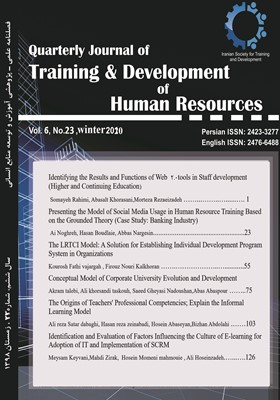The origins of teachers' professional competencies; Explain the informal learning model
Subject Areas :hasan reza zeinabadi 1 , Alireza Sattardabbaghi 2 , Hossein Abbasian 3 , بیژن عبدالهی 4
1 -
2 -
3 -
4 -
Keywords: Informal education Learning Informal learning teachers,
Abstract :
The comprehensive development of education in any country depends on professional teachers; One of the most effective ways to educate teachers is to use informal learning. The main purpose of this research is to identify and prioritize informal teaching methods for high school teachers. The present study is objective in terms of purpose, exploratory in terms of subject matter, applied-developmental in nature, and descriptive-analytical study. In this study, a combined approach was used. In the qualitative part, using exploratory method, in addition to open and central coding, the methods and informal learning method were identified and in the quantitative part, using the survey method, the current situation of informal teaching methods of teachers was identified. In this research, in order to gather information in the qualitative part of the semi-constructed interview tool with purposeful sampling (snowball) and the retest method and internal agreement, a topic was performed to calculate the reliability of the interviews and in a small part to ensure the reliability of the questionnaire The Cronbach's alpha coefficient was 0.90. 349 teachers were estimated as a sample size by stochastic, random, multi-step method and using statistical determinants of the size of the population of statistical population (3724 people). Based on the research findings, 16 methods of acquiring competencies were identified, which were divided into 5 categories: discussion with others (including components of inferring from others' statements, learning through discussions and dialogue, informal verbal messages), interaction with peers (including project components). - Activity with others - Sharing experiences - Thought storm), Behavior (including components of imitation of others - Inference from the behavior of others - Admirable non-verbal behavior - Compulsory non-verbal behavior), Cyberspace (including Internet search components - Presence in networks Social) and experience (including components of trial and error during teaching - attending scientific out-of-school circles - classroom feedback feedback).
1.Nadi, Mohammad Ali, Sajjadian, Ilenaz (2009). Activities, environmental deterrents and individual characteristics affect the informal learning of teachers in Isfahan. Quarterly Journal of Educational Innovation. No. 30: 157 - 185.
2.Zaraat Kar, Somayeh, Mohammadi Elyasi, Ghanbar, Zarei Matin, Hassan, Alvani, Seyed Mehdi and Babaei, Mohammad Ali (2016). Identify informal learning methods for fostering human resource managers in large organizations in the country. Journal of Organizational Culture Management. No. 2: 323-343.
3.Manteghi, Morteza, Farmani, Shiva and Pourmand, Fahimeh (2013). Comparative study of informal learning of male and female students in the university. Quarterly Journal of Cognitive Psychology. No. 2: 41-58.
4.Najafi, Taktam, Atashi, Seyed Hossein and Jafari, Alireza (2012). Investigating and comparing the status of formal and informal learning and its resources in students. Scientific-Research Quarterly of Military Management. No. 48: 197-226.
5.Marsick, V., Watkins, K (1997). Lessons from informal and incidental learning. in Burgoyne, J., Reynolds, M. (Eds),Management Learning: Integrating Perspectives in Theory and Practice, Sage, Thousand Oaks, CA, PP. 295-311.
6.Johnson, D (1999).A learning model for learning organizations.Futurics, 23 (1/2) PP. 74-5.
7.Cseh, M., Watkins, K.E., Marsick, V.J (1999). Re-conceptualizing Marsick and Watkins‘ model of informal and incidental learning inthe workplace. paper presented at the Academy of Human Resource Development Conference, Washington, DC, March .
8.Wenger, E., McDermott, R. A., & Snyder, W. (2002). Cultivating communities of practice: A guide to managing knowledge. Harvard Business Press.
9.Lohman, M.C (2006). Factors influencing teachers’ engagement ininformal learning activities. Journal of workplace Learning. Vol18.No3: 147- 156.
10.Tannenbaum, S. I.; Beard, R. I.; McNall, L. A.; Salas. E. (2010). Informal learning and development in organizations, New York & London, Routledge Taylor & Francis Groups.
11.Eraut, M (2011). “Informal Learning in the workplace: evidence on the real value of work-based leraning(WBL)”. Development and Learning in Organizations, 25(5), 8-12.
12.Bashokouh, Mohammad and Pouramini, Zahra (2016). This is a method for effective non-formal learning of principals and deputies of secondary schools in Ardabil city, School Psychology Magazine. Course 5. No. 3: 7-23.
13.Salehi Omran, Ebrahim, Izadi, Samad, Faraji, Shiva (2016). Investigating the role of informal learning in fostering key competencies in higher and vocational education environments. Journal of Research in Curriculum Planning. Course 13. No. 24: 87-106.
14.Hasrati, Mostafa Vahshami, Reza (2010). Informal learning in doctoral courses: A case study at a university in western Iran. Quarterly Journal of the Higher Education Association of Iran. second year . No. 4: 180-200.
15.Treasure-Jones, T., Sarigianni, C., Maier, R., Santos, P., & Dewey, R. (2019). Scaffolded contributions, active meetings and scaled engagement: How technology shapes informal learning practices in healthcare SME networks. Computers in Human Behavior.
16.Prestridge, S. (2019). Categorising teachers’ use of social media for their professional learning: A self-generating professional learning paradigm. Computers & Education, 129, 143-158.
17.Marsick, V. J., & Neaman, A. (2018). Adult informal learning. In Informelles Lernen (pp. 53-72). Springer VS, Wiesbaden.
18.Cerasoli, C. P., Alliger, G. M., Donsbach, J. S., Mathieu, J. E., Tannenbaum, S. I., & Orvis, K. A. (2018). Antecedents and outcomes of informal learning behaviors: A meta-analysis. Journal of Business and Psychology, 33(2), 203-230.
19.Kyndt, E., Gijbels, D., Grosemans, I., & Donche, V. (2016). Teachers’ everyday professional development: Mapping informal learning activities, antecedents, and learning outcomes. Review of educational research, 86(4), 1111-1150.
20.Strauss, Anselm and Corbyn, Juliet (1990). Principles of qualitative research methods. Basic theory of procedures and practices. Translated by Dr. Buick Mohammadi (2006). Tehran . Institute of Humanities and Cultural Studies.
21.Hoekstra, A., Brekelmans, M., Beijaard, D., & Korthagen, F. (2009). Experienced teachers' informal learning: Learning activities and changes in behavior and cognition. Teaching and Teacher Education, 25(5), 663-673.


